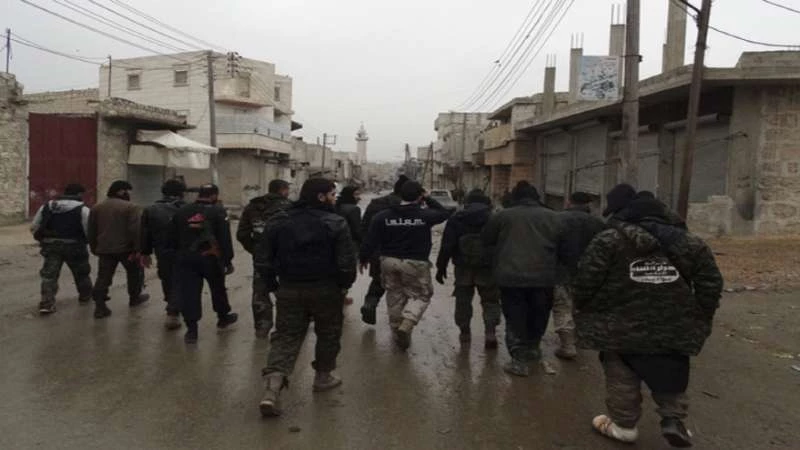More than that, however, a series of local truces — the most notable recent example being east Aleppo in December — almost ensured the inevitability of such clashes as they entailed the evacuation of rebels with differing allegiances and ideologies from various parts of the country into Idlib.
While this gave besieged rebels relative safety in the largest remaining opposition stronghold, the likelihood of tensions and open conflict between them must have been a major, if not the primary, consideration for the regime when negotiating those truces.
Clashes began in December when former al-Qaeda affiliate Jabhat Fateh al-Sham (JFS) launched mass assaults against Free Syrian Army (FSA) factions.
JFS said it was acting pre-emptively to “thwart conspiracies” against it at talks in Astana, Kazakhstan, brokered by Russia, Turkey and Iran. It said it had been “sidelined” by groups “trying to divert the course of the revolution towards reconciliation with the criminal regime” of Bashar Assad.
However, the late January talks ended with no breakthrough or major concessions from opposition delegates, indicating that JFS’s consternation lay in the very presence of rebel groups in Astana rather than their negotiating position.
Its expressed reason for attacking the FSA is also undermined by the fact that Islamist group Ahrar al-Sham — to which rebel factions have flocked for protection from the JFS campaign — did not attend the talks but nonetheless said it would support groups that did if they secured a favourable outcome for the opposition.
As such, the JFS position likely reflects paranoia at being excluded from the ceasefire and peace tracks. Its assaults may also be designed to secure its dominance in Idlib, viewing arrivals from other groups as a potential challenge.
After JFS quickly wiped out the FSA faction Jaish al-Mujahideen, several groups formed an alliance with Ahrar al-Sham, a major player in Idlib, with an FSA official saying JFS “wants to end the FSA”.
Ahrar al-Sham said the JFS assault was “without justification” and benefited the regime. It said it would join its “brothers” to contain JFS if it did not cease fire, accused it of rejecting mediation attempts and warned it that any attack on its members would be considered a “declaration of war”.
Several Islamist factions subsequently said they were joining forces with JFS. They said this was meant to heal rebel divisions and create a stronger front against the regime but, given the timing of its creation, it looks more like a response to the alliance formed around Ahrar al-Sham.
If that is the case, the stage is set for what could be the worst rebel infighting yet, at the best possible time for the regime.
The JFS assault is self-defeating, whether it makes military gains or not. An alliance against it headed by the powerful Ahrar al-Sham may be able to push it back or at least inflict significant losses. However, if JFS gains ground, this would make it easier for the various air forces active in Syrian skies to target it.
Until now, despite JFS being excluded from ceasefires, some (mainly Western) air forces have been hesitant about hitting the group in areas where other rebel factions are present.
Clearing rebels in its midst would remove that reticence, leading to more air strikes against it. The Pentagon said in December that a single attack by a B-52 bomber killed more than 100 JFS fighters. The group would not want such a large casualty toll repeated.
The JFS assault will make it increasingly unpopular among Assad’s domestic opponents — civilian and military — as the resultant fracturing and weakening of rebel ranks will play into his hands at a time when he has never felt more secure since the revolution against him began in 2011.
One of its officials, Ali Haidar, said in January the regime was ready for “open battle” against rebels in Idlib. The regime “is clear in its policy when it said it will not forego any patch of Syria and I think Idlib is one of the coming hot areas”, Haidar said.
The JFS assault risks handing the province on a platter, which would be disastrous for the opposition because of Idlib’s strategic value — a major rebel stronghold bordering Turkey that is an important supply route.
Capturing it would secure the Damascus-Aleppo highway, which rebels have used as a supply route, and neighbouring Latakia, Assad’s home province and a regime stronghold.
Syrian revolutionaries would not forgive JFS for benefiting the regime in such an important area of conflict.
Regime opponents are mindful of its history of attacking and defeating FSA factions, and of its attempts to quell pro-FSA protests in rebel-held territory during ceasefires. JFS is painting itself into a corner and dragging the Syrian revolution with it.
Sharif Nashashibi (The Arab Weekly)



التعليقات (0)